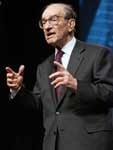
Former Federal Reserve Chairman Alan Greenspan said the U.S. needs to reform its healthcare system if it is to fulfill its Medicare obligations and for American companies to stay competitive in the world economy.
Greenspan was a keynote speaker during the Healthcare Information and Management Systems Society (HIMSS) conference April 8 in Chicago.
“We knew Medicare would have an explosion of new baby-boomers in 1983, but they decided they had 20 years to fix the problem,” Greenspan said. “We have done virtually nothing
Today he said funding levels remain stagnant while large numbers of baby boomers begin to flow into the Medicare system. He said the rate of new patients and the levels of reimbursement and funding as they currently stand are simply not sustainable and the government will have to take action at some point to prevent the system from failing.
Today he said government funding for Medicare is less than half of what Medicare actually costs each year. “We are not financing the amount of entitlement that we have on the books,” he said.
In addition to rising Medicare costs, Greenspan said the U.S. economy will suffer unless broader healthcare reform is undertaken. He said many countries that offer government-supported medical systems have taken the burden of healthcare insurance costs off its workers and employers, while the U.S. has a system where companies carry the additional costs of healthcare insurance, making their employees and goods more expensive on the world market. A new healthcare solution should be sought, Greenspan said, but did not say specifically what reforms he would suggest.
